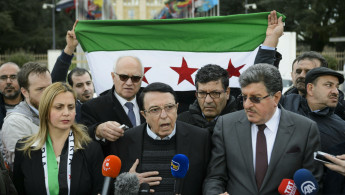Syria opposition slams US-Russia deal as 'kind of genocide'
The spokesman for the Saudi-backed Syrian High Negotiations Committee [HNC] has said that a ceasefire deal brokered by Washington and Moscow is "unfair" and will lead to a "civilian genocide".
Riad Nassan Agha told The New Arab on Saturday that the agreement, which is meant to end hostilities and ensure aid deliveries, will result in more civilian casualties and has ignored key issues such as Syrian President Bashar al-Assad fate.
On Friday, the United States and Russia agreed a plan to impose a ceasefire in the Syrian civil war, which will come into force on Monday, the first day of the Muslim holiday of Eid al-Adha.
It will be followed by coordinated strikes against al-Nusra Front jihadist rebels and the Islamic State group [IS] - shouldthe truce hold for a week.
"We agree in principle to a total ceasefire, however, the deal allows the US and Russia to carry out air raids with a pause from the regime, this means they think the only terrorism is Sunni terrorism," Agha said.
"Lavrov and Kerry have omitted the thousands of terrorists from around the world fighting alongside the regime such as Hizballah, Harakat al-Nujaba and others. The deal has also failed to mention Iran's role."
The HNC spokesman said that agreement will not protect civilians living in areas held by terrorists because there are currently no safe zones for them to evacuate to.
 |
No one will be killed more than civilians. Maybe the deal is an excuse to kill the civilians, which they have called hosts of terrorism. It is a kind of genocide of the Syrian people. - Riad Nassan Agha |
 |
"No one will be killed more than civilians. Maybe the deal is an excuse to kill the civilians, which they have called hosts of terrorism. It is a kind of genocide of the Syrian people," he added.
"The deal is unfair and will not sit well with the people. If we are heading towards a popular political solution then the way forward will not at the expense of the blood of the Syrian people."
"Will the regime be punished if they break the ceasefire or will the punishment only be for the opposition factions if they retaliate?"
"They have not mentioned anything about the fate of Assad and they both know well that terrorism cannot be combated while he is in power."
Opposition leaders at a special conference in London on Wednesday called for international support for the removal of Assad from power, saying negotiations had failed because of the Damascus leader's intransigence.
On Saturday, the US special envoy to Syria appealed to rebels to commit to the landmark ceasefire deal.
In the letter written in Arabic to "the armed Syrian opposition factions", Washington's special envoy for Syria Michael Ratney said the truce deal is the "best way" to save lives.
"We believe this truce can be more effective than its predecessor because it can halt Syrian airstrikes on civilians and the opposition," Ratney wrote.
Earlier on Saturday, Iqab Yahya, a member of the HNC told The New Arab that his group supports the US-Russian deal.
"We stand in support of agreement that provides a suitable environment for a political resolution to the conflict," Yahya said.
However, Yahya also expressed hesitation to whether the Syrian regime will implement the agreement.
"Implementation will determine the fate of this truce which we hope will be a permanent one that lifts the siege on some areas to allow a safe passage for convoys."
Shortly after the joint US-Russian announcement late on Friday, the Islamist Ahrar al-Sham group rejected the plan to target Jabhat Fath al-Sham, formerly known as al-Nusra Front.
"We refuse the bombardment of Jabhat Fath al-Sham by US and Russian warplanes on principle," a source within Ahrar al-Sham told The New Arab.





 Follow the Middle East's top stories in English at The New Arab on Google News
Follow the Middle East's top stories in English at The New Arab on Google News
![Israeli forces ordered bombed Gaza's Jabalia, ordering residents to leave [Getty]](/sites/default/files/styles/image_330x185/public/2176418030.jpeg?h=a5f2f23a&itok=_YGZaP1z)

